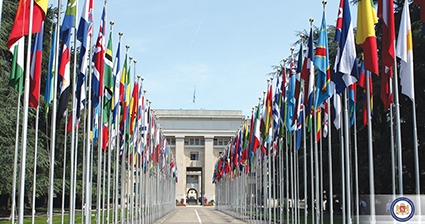43rd Round of Geneva Int’l Talks Ends without Results
Official Tbilisi has released a statement regarding the 43rd round of the Geneva International Discussions, the only format of an ongoing international dialogue between Georgia and Russia, held on March 27-28 in Geneva. They stated the Russian Federation had demonstrated a “destructive approach and with deliberate provocative statements brought the talks into a deadlock over the issue of non-use of force.”
The non-use of force is one of the key issues of the Geneva Discussions. Georgia made a one-sided promise about the non-use of force in 2010 and demands the same from the Russian Federation. However, Russia, which claims that it does not consider itself a part of the conflict, wants Georgia to sign such agreements with its breakaway regions of Abkhazia and South Ossetia. Such an initiative is unacceptable for the Georgian side.
The talks are usually held within a two meeting-group format. At one meeting, the sides discuss security and stability issues in Georgia’s breakaway Abkhazia and Tskhinvali regions, while the second meeting concerns the safe return of Internally Displaced Persons (IDPs) and refugees to their homes.
The discussions are held with Co-Chairmanship of the EU, UN and OSCE, and with the participation of Georgia, the Russian Federation and the USA. The representatives of the Sokhumi and Tskhinvali occupation regimes also attend the Working Groups.
Georgia’s Ministry of Foreign Affairs (MFA) reports that the Georgian and US sides condemned the death of Archil Tatunashvili, a Georgian citizen who died in occupied Tskhinvali in custody, in unclear circumstances, on February 23.
“The Georgian participants imposed full responsibility on the Russian Federation as it carries out effective power control in the occupied regions,” the MFA reports.
Tbilisi also demanded the creation of international security mechanisms in the occupied regions of Georgia in full compliance with the ceasefire agreement made between Georgia and Russia in August 2008 after the war.
“The Georgian and American participants emphasized the necessity of confirmation of the non-use of force by the Russian Federation and its implementation,” the statement reads.
At the meeting, the Georgian participants raised the issue of severe security, human rights and humanitarian situations in the occupied territories, as well as Russian steps towards the annexation of Georgia’s occupied regions.
Installation of barbed wire fences, artificial barriers and the detention of Georgian citizens at the so called borders were also condemned by Official Tbilisi.
As usual, representatives of the Russian federation and de facto authorities of Georgia’s occupied Abkhazia and South Ossetia left the Geneva International Talks while discussing the issues on the safe and dignified return of IDPs and refugees to their homes in the occupied regions.
The Russian Foreign Ministry also released a statement about the Geneva Talks, saying the Georgian side turned the meeting into a “propaganda rally.”
Moscow says all the statements made by Tbilisi are based on the “faded issue of Russian occupation.”
“The Georgian side still tried to impose responsibility on Russia for its own failure to regulate relations with Sokhumi and Tskhinvali,” the Russian side stated.
The statement also reads that Georgia accuses Russia in the Tatunashvili case, saying it is “unacceptable.”
“Unfortunately, there was no constructive conversation about the general statement of non-use of force,” Russia added.
The Kremlin also expressed concern about Georgia-NATO military cooperation, adding there are no guarantees that Georgia will not use its western weapons against its neighbors.
“This threatens regional stability in the South Caucasus,” the Russian MFA added.
The OSCE also released a statement regarding the Geneva Discussions, saying despite intensive engagement by all participants, it did not prove possible to finalize the draft joint statement on non-use of force.
The organization added that Co-Chairs will continue their consultations in this regard. The next round of talks will be held in June.
Thea Morrison












